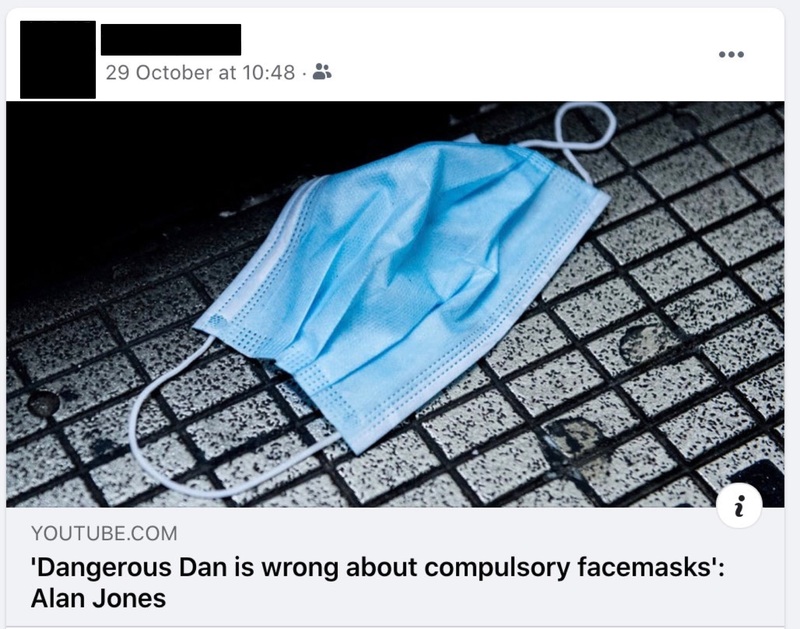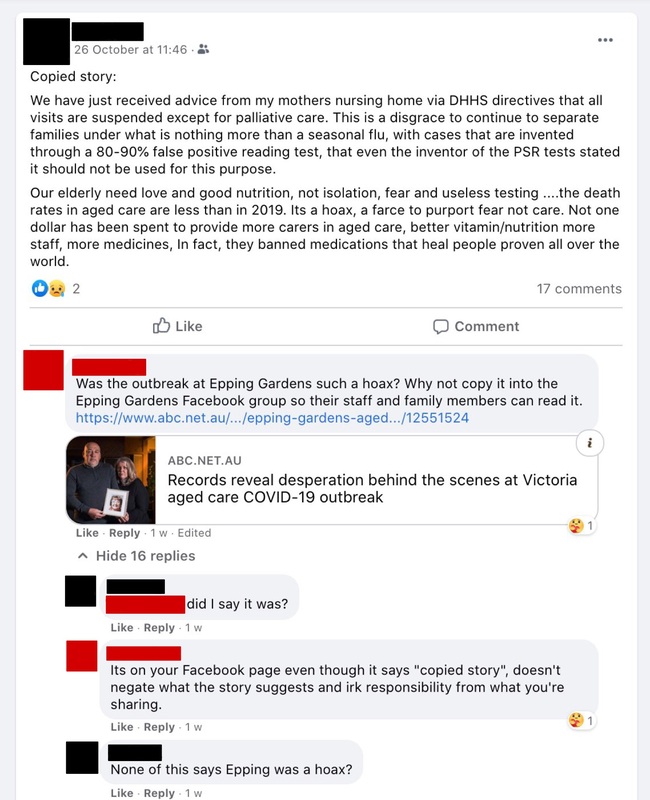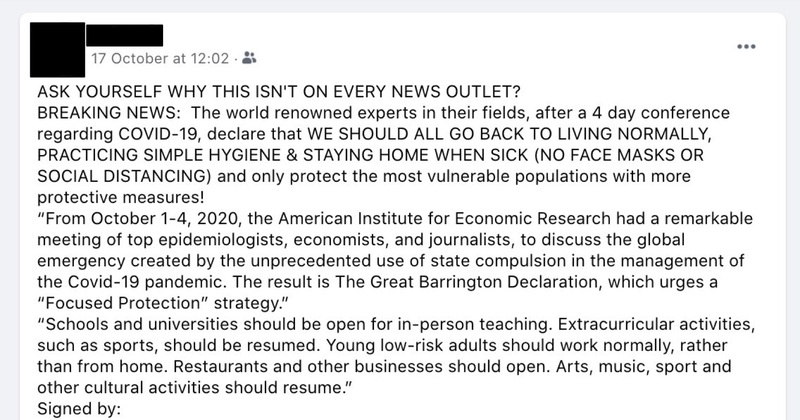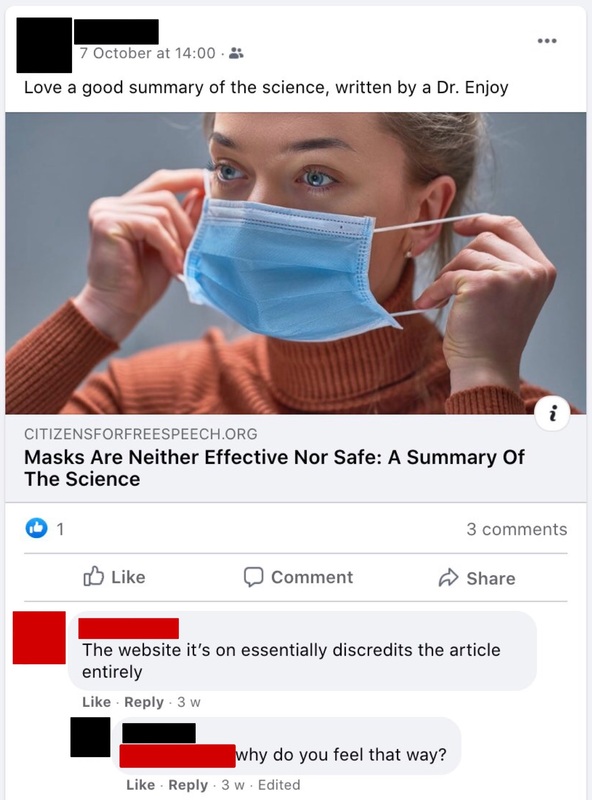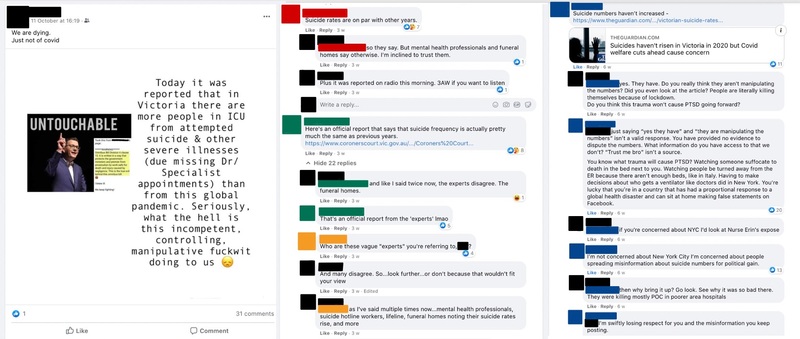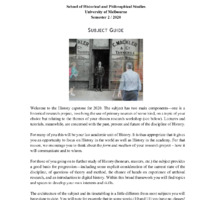Item
Fear, Fiction, and Facebook
Title (Dublin Core)
Fear, Fiction, and Facebook
Disclaimer (Dublin Core)
DISCLAIMER: This item may have been submitted in response to a school assignment. See Linked Data.
Description (Dublin Core)
(HIST30060) Content warning: suicide mention.
As the pandemic has developed over the course of the year and Victoria has progressed through lockdowns, a Facebook friend of mine from high school has taken to discussing COVID-19 extensively. She posts very regularly (on average between 20 and 30 times per day) with commentary on the pandemic, ranging from sanctimonious to outraged, sharing posts from conspiracy groups, pandemic-denying politicians, and other Facebook users that downplay the existence or severity of the virus. The series of unsubstantiated claims and recurrent mentions of ‘breaking news’ from various unnamed rogue health workers results in some of her Facebook friends querying her content and questioning the validity of her sources. When they reply to her posts, her Facebook friends often attempt to share news articles and updates from verified, fact-checked sources, but when this happens she talks past them, avoids the question, engages in a range of logical fallacies, or outright denies the validity of the information with which she’s been presented. In particular, she received significant backlash from her friends when she shared a post about the Australian suicide rate in 2020, crediting an alleged (untrue) increase directly to the lockdowns: one friend responded to say ‘I’m swiftly losing respect for you and the misinformation you keep posting.’ Earlier in the year, her posts gained greater traction among her Facebook friends: people would react to them, comment with information, speculation, or gentle disagreement; by now (November), the engagement her posts receive has dwindled down to the occasional like, but usually nothing more than that.
Seeing her posts when I checked Facebook began to remind me of a conversation I’d had with my housemate about the role of fear and a desire for control behind belief in conspiracy theories; namely that these belief systems might bring warped comfort on some level. In situations that are scary, believing in some nameless, faceless ‘them’, or connecting with other people who claim to have secret insider information hidden from the general public, might help ease a feeling of powerlessness by believing someone is in control. I would allege her Facebook posts stem at least in part from fear, which I feel is more than understandable given an underlying experience for many people this year has been a deep, semi-constant sense of paralytic uncertainty.
While I empathise with this, and genuinely feel compassion towards her for what she’s going through, I can’t help but think the way she has responded to these feelings is irresponsible at best, and dangerous at worst. I find her advocacy of the importance of independent research and critical thinking approaches irony, as the ‘research’ she describes appears to consist of discussing factually incorrect information with other scared people who are also searching for stability and predictability. I don’t begrudge her the fear she feels in any capacity, nor do I want to pass judgement on how others cope with this experience, but I can’t help feeling that this does more harm than good; I worry it proliferates false information, and further demoralises those who read it. While individual conjecture, ideas, philosophising, and critical thinking are absolutely necessary and a healthy degree of scepticism is vital when reading anything, I believe there is a degree of responsibility one assumes to check, even cursorily, that the content they’re sharing has some basis in fact, especially in instances like this where people are quite literally dying. While the experience of the pandemic is undoubtedly having a severe effect on her, I feel irritated reading her advocacy of things that will objectively place other people at risk of illness. It seems to me insensitive to spread deliberately divisive misinformation, given there are people who are assume risk every day when they go to work (even in a country that has implemented measures to control the spread of the disease, when many countries overseas have not). I worry about the broader social repercussions of the division and polarisation that misinformation contributes to, both in the case of COVID-19 and in other contexts.
When I look over the things she’s been posting on Facebook, I feel overwhelming pity and compassion for what she is going through individually, and what everyone in Victoria is undergoing as a collective. I understand that everyone is coping with an extremely stressful and emotionally taxing experience and is attempting to manage as well as they can. I’ve seen parallels drawn between the COVID-19 pandemic and previous pandemic disease outbreaks and major historical events in general, and the comfort people derive from a sense of shared experience during difficulty. I think in part the pandemic has cemented in my mind the confronting fact that being alive is just living through a series of major historical events; that history is not something that has happened to other people, in other places, at other times, but is happening now and will continue to happen, over and over. While this is incredibly confronting to think about and dredges up an overwhelming feeling of powerlessness at times, it seems to me by looking at both the past and the present that people working to mutually support each other make upheaval, fear, and uncertainty much easier to bear.
As the pandemic has developed over the course of the year and Victoria has progressed through lockdowns, a Facebook friend of mine from high school has taken to discussing COVID-19 extensively. She posts very regularly (on average between 20 and 30 times per day) with commentary on the pandemic, ranging from sanctimonious to outraged, sharing posts from conspiracy groups, pandemic-denying politicians, and other Facebook users that downplay the existence or severity of the virus. The series of unsubstantiated claims and recurrent mentions of ‘breaking news’ from various unnamed rogue health workers results in some of her Facebook friends querying her content and questioning the validity of her sources. When they reply to her posts, her Facebook friends often attempt to share news articles and updates from verified, fact-checked sources, but when this happens she talks past them, avoids the question, engages in a range of logical fallacies, or outright denies the validity of the information with which she’s been presented. In particular, she received significant backlash from her friends when she shared a post about the Australian suicide rate in 2020, crediting an alleged (untrue) increase directly to the lockdowns: one friend responded to say ‘I’m swiftly losing respect for you and the misinformation you keep posting.’ Earlier in the year, her posts gained greater traction among her Facebook friends: people would react to them, comment with information, speculation, or gentle disagreement; by now (November), the engagement her posts receive has dwindled down to the occasional like, but usually nothing more than that.
Seeing her posts when I checked Facebook began to remind me of a conversation I’d had with my housemate about the role of fear and a desire for control behind belief in conspiracy theories; namely that these belief systems might bring warped comfort on some level. In situations that are scary, believing in some nameless, faceless ‘them’, or connecting with other people who claim to have secret insider information hidden from the general public, might help ease a feeling of powerlessness by believing someone is in control. I would allege her Facebook posts stem at least in part from fear, which I feel is more than understandable given an underlying experience for many people this year has been a deep, semi-constant sense of paralytic uncertainty.
While I empathise with this, and genuinely feel compassion towards her for what she’s going through, I can’t help but think the way she has responded to these feelings is irresponsible at best, and dangerous at worst. I find her advocacy of the importance of independent research and critical thinking approaches irony, as the ‘research’ she describes appears to consist of discussing factually incorrect information with other scared people who are also searching for stability and predictability. I don’t begrudge her the fear she feels in any capacity, nor do I want to pass judgement on how others cope with this experience, but I can’t help feeling that this does more harm than good; I worry it proliferates false information, and further demoralises those who read it. While individual conjecture, ideas, philosophising, and critical thinking are absolutely necessary and a healthy degree of scepticism is vital when reading anything, I believe there is a degree of responsibility one assumes to check, even cursorily, that the content they’re sharing has some basis in fact, especially in instances like this where people are quite literally dying. While the experience of the pandemic is undoubtedly having a severe effect on her, I feel irritated reading her advocacy of things that will objectively place other people at risk of illness. It seems to me insensitive to spread deliberately divisive misinformation, given there are people who are assume risk every day when they go to work (even in a country that has implemented measures to control the spread of the disease, when many countries overseas have not). I worry about the broader social repercussions of the division and polarisation that misinformation contributes to, both in the case of COVID-19 and in other contexts.
When I look over the things she’s been posting on Facebook, I feel overwhelming pity and compassion for what she is going through individually, and what everyone in Victoria is undergoing as a collective. I understand that everyone is coping with an extremely stressful and emotionally taxing experience and is attempting to manage as well as they can. I’ve seen parallels drawn between the COVID-19 pandemic and previous pandemic disease outbreaks and major historical events in general, and the comfort people derive from a sense of shared experience during difficulty. I think in part the pandemic has cemented in my mind the confronting fact that being alive is just living through a series of major historical events; that history is not something that has happened to other people, in other places, at other times, but is happening now and will continue to happen, over and over. While this is incredibly confronting to think about and dredges up an overwhelming feeling of powerlessness at times, it seems to me by looking at both the past and the present that people working to mutually support each other make upheaval, fear, and uncertainty much easier to bear.
Date (Dublin Core)
Creator (Dublin Core)
Contributor (Dublin Core)
Event Identifier (Dublin Core)
Partner (Dublin Core)
Type (Dublin Core)
Screenshots from Facebook
Controlled Vocabulary (Dublin Core)
English
Social Media (including Memes)
English
Emotion
English
Pandemic Skeptics
English
Social Distance
English
Education--Universities
Curator's Tags (Omeka Classic)
Contributor's Tags (a true folksonomy) (Friend of a Friend)
Collection (Dublin Core)
English
Mental Health
Linked Data (Dublin Core)
Date Submitted (Dublin Core)
11/08/2020
Date Modified (Dublin Core)
02/16/2021
03/08/2021
Date Created (Dublin Core)
10/06/2020
This item was submitted on November 9, 2020 by Siobhan Thomas using the form “Share Your Story” on the site “A Journal of the Plague Year”: http://mail.covid-19archive.org/s/archive
Click here to view the collected data.
